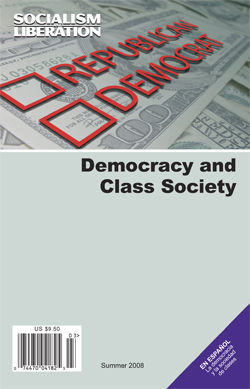 This PSL Publication features revolutionary Marxist analysis, and critical history, on the meaning of democracy. It is designed to provide much-needed clarity on what is and what is not at stake in the bourgeois elections.
This PSL Publication features revolutionary Marxist analysis, and critical history, on the meaning of democracy. It is designed to provide much-needed clarity on what is and what is not at stake in the bourgeois elections.
The book is divided into three main sections. Section 1, “Democracy for the Ruling Class,” which explains how very different social systems have used ostensibly “democratic” forms, from pre-class societies to ancient slavery to the bourgeoisie. Section 2, “Democracy and U.S. Imperialism,” discusses just how undemocratic the U.S. political system is, and Section 3 “Democracy for the Working Class” shows how the revolutionary transformation of society to deliver democracy to the vast majority.
The full book is available below and can be ordered in print here.